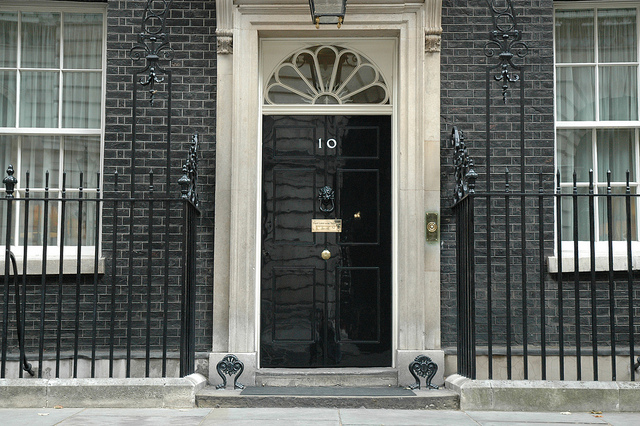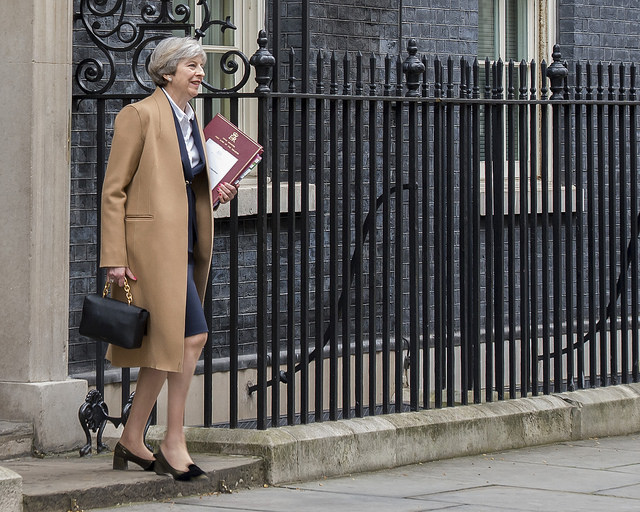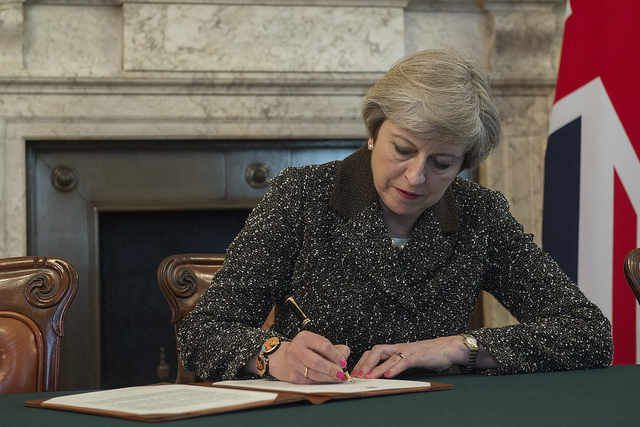Verre oorden (deel 2)

Een jaar na het succesvolle Brexit referendum, liggen de kaarten allemaal aan de kant van de Europese Unie. Wat Brexit betekent in zo'n klimaat laat zich raden, zelfs na twaalf maanden. (Engelstalige blog)
This is the second part of an analysis on the latest developments concerning Brexit and UK politics, if you did not read the first part (Distant shores (part 1)), you might prefer to do that first.
3. A new prime minister?: Whilst the odds remain on the Conservative Party striking a deal with the DUP, there exists the distinct possibility of Mrs May losing the vote on the Queen’s Speech – in which case she would (in terms of political reality, not constitutional terms) be compelled to tender her resignation as Prime Minister and presumably Conservative Party leader as well. At such a point, the Labour Party could attempt to form a minority government of its own – however, despite its gains in the recent general election, Labour only holds 262 of 650 seats in the House of Commons, well short of the winning line of 326 seats.
Consequently, in case the Queen’s Speech is actually defeated, the most likely option (especially given the Fixed Term Parliaments Act 2011) would be for a new Conservative leader to either form a new government within 14 days (since the Queen’s Speech being voted down is traditionally regarded as a vote of no-confidence) or Parliament to be dissolved in the event this does not happen. However, a swift leadership succession in case Mrs May resigns is somewhat complicated by the Conservative Party’s leadership election rules, which require an endorsement of a new leader by the membership of the Party – unless there is only one candidate.
4. Ripples in Brussels: Of course, the widespread instability in the UK has not gone unnoticed by the European Union and its leading Member States. The British government’s negotiating position has been weakened by the general election result, and European partners can no longer be certain that Prime Minister May will be able to guarantee the delivery any deal struck with the European Union. In fact, it is uncertain whether Mrs May will be around to preside over Britain’s withdrawal from the European Union in March 2019. In such a climate, it is not surprising that Brexit Secretary David Davis has already given way on the issue of the sequencing of the Brexit talks (namely whether the terms of Britain’s withdrawal should go first or alongside with negotiations on any putative UK-EU free trade deal). Meanwhile, Mrs May has decided to make a first offer regarding the status of EU nationals in the UK. However, the crucial issue in this regard will be who will enforce the rights of the approximately 3 million EU citizens in the UK: EU leaders are likely to resist any attempt by the British government to have this issue adjudicated by the UK courts.
All of that said, time is not on Britain’s side: The negotiations have to be completed by 29 March 2019. If they are not, and no deal has been reached, Britain will trade under much less favourable WTO rules, face major import tariffs from the EU and any EU legislation will lapse. However, the European Union should also resist the temptation of being condescending or very pleased with itself. Its problems are far from resolved, its structural defects remain and the fundamental problems which trigger legitimate Euroscepticism are no less relevant today than they were on 23 June 2016.
5. New approaches needed: The possibility of internecine warfare in the Conservative Party over the European Question was highlighted by this week’s public performances by two cabinet ministers: Foreign Secretary Boris Johnson, who delivered a widely-panned radio interview on Brexit and Chancellor of the Exchequer Philip Hammond who is deftly distancing himself from the hard Brexit aspirations by Mrs May and quietly positioning himself for the inevitable leadership campaign to come, once Mrs May has been forced out of office. This jockeying for power, paired with the disappearance of virtually any authority Mrs May enjoyed prior to the election, is a recipe for political instability. Whether it’s Mrs May or someone else, a new approach on Brexit is needed – preferably one that is centred on a national consensus and sufficiently considers the legitimate concerns of those 48% who voted to remain in the European Union. This may very well mean some type of modified EEA membership with immigration caps, remaining a member of the customs union or some form of compromise that may well have to break with some of the red lines articulated by Mrs May. Such a deal can only be delivered on a cross-party basis, not by a minority government alone.
What Brexit means in such a climate is anyone’s guess, even twelve months later. Indeed, stability and certainty look like two distant shores in the midst of the current political chaos.
Lees ook Distant shores (part 1)
Gepubliceerd op Law Blogs Maastricht, image by Number 10 on Flickr
Andere blogs:
Lees ook
-
Zij beslist: Arleen Foster, MLA, de leider van de ''Democratic Unionist Party'' heeft de touwtjes goed in handen in de conservatieve minderheidsregering. (Engelstalige blog)
-
Een jaar na het succesvolle Brexit referendum, liggen de kaarten allemaal aan de kant van de Europese Unie. Wat Brexit betekent in zo'n klimaat laat zich raden, zelfs na twaalf maanden. (Engelstalige blog)
-
Theresa May’s gok liep slecht af. Nu ligt alles open – ook de Brexit. (Engelstalige blog)


